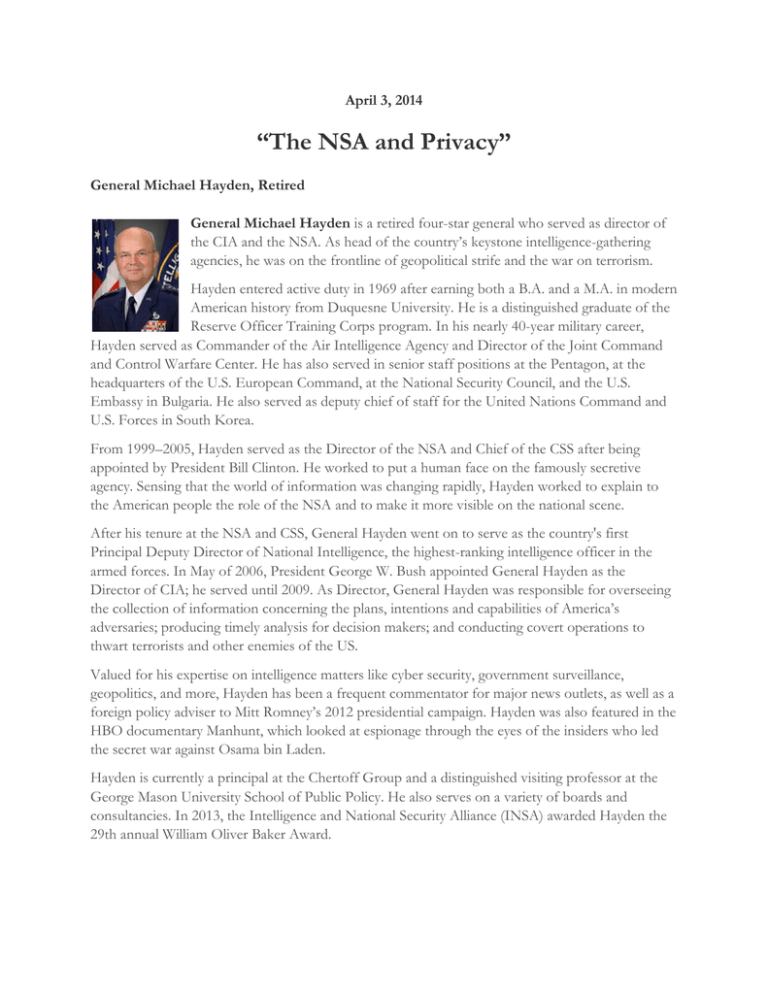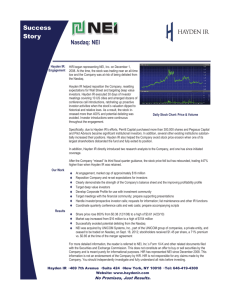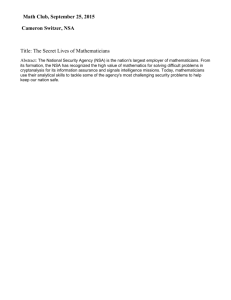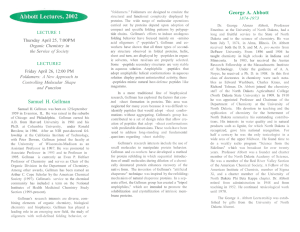“The NSA and Privacy”
advertisement

April 3, 2014 “The NSA and Privacy” General Michael Hayden, Retired General Michael Hayden is a retired four-star general who served as director of the CIA and the NSA. As head of the country’s keystone intelligence-gathering agencies, he was on the frontline of geopolitical strife and the war on terrorism. Hayden entered active duty in 1969 after earning both a B.A. and a M.A. in modern American history from Duquesne University. He is a distinguished graduate of the Reserve Officer Training Corps program. In his nearly 40-year military career, Hayden served as Commander of the Air Intelligence Agency and Director of the Joint Command and Control Warfare Center. He has also served in senior staff positions at the Pentagon, at the headquarters of the U.S. European Command, at the National Security Council, and the U.S. Embassy in Bulgaria. He also served as deputy chief of staff for the United Nations Command and U.S. Forces in South Korea. From 1999–2005, Hayden served as the Director of the NSA and Chief of the CSS after being appointed by President Bill Clinton. He worked to put a human face on the famously secretive agency. Sensing that the world of information was changing rapidly, Hayden worked to explain to the American people the role of the NSA and to make it more visible on the national scene. After his tenure at the NSA and CSS, General Hayden went on to serve as the country's first Principal Deputy Director of National Intelligence, the highest-ranking intelligence officer in the armed forces. In May of 2006, President George W. Bush appointed General Hayden as the Director of CIA; he served until 2009. As Director, General Hayden was responsible for overseeing the collection of information concerning the plans, intentions and capabilities of America’s adversaries; producing timely analysis for decision makers; and conducting covert operations to thwart terrorists and other enemies of the US. Valued for his expertise on intelligence matters like cyber security, government surveillance, geopolitics, and more, Hayden has been a frequent commentator for major news outlets, as well as a foreign policy adviser to Mitt Romney’s 2012 presidential campaign. Hayden was also featured in the HBO documentary Manhunt, which looked at espionage through the eyes of the insiders who led the secret war against Osama bin Laden. Hayden is currently a principal at the Chertoff Group and a distinguished visiting professor at the George Mason University School of Public Policy. He also serves on a variety of boards and consultancies. In 2013, the Intelligence and National Security Alliance (INSA) awarded Hayden the 29th annual William Oliver Baker Award. Barton Gellman, Washington Post Barton Gellman is a two time Pulitzer Prize winning journalist and lead reporter on Edward Snowden's NSA disclosures at the Washington Post. A critically honored author, journalist, and blogger, Gellman is a senior fellow at the Century Foundation and Lecturer and Author in Residence at Princeton's Woodrow Wilson School. Gellman graduated summa cum laude from the Woodrow Wilson School of Public and International Affairs at Princeton University. He then went on to earn his M. Litt. in politics at University College, Oxford, as a Rhodes Scholar. Gellman spent 21 years on the staff of the Washington Post. He covered the Washington, D.C. courts, 1991 Persian Gulf War, U.S. intervention in Somalia, and the social upheavals relating to the status of gays and women in the military. In 1994, Gellman became Jerusalem bureau chief, covering peace negotiations, the assassination of Yitzhak Rabin, and the ascent of Benjamin Netanyahu. Later, Gellman returned to Washington as a diplomatic correspondent, covering Secretary of State Madeleine Albright and the collapse of the UNSCOM effort to disarm Iraq. In 1999, Gellman moved to New York to take up a role as a special projects reporter, covering the global AIDS pandemic, the post-9/11 war with al Qaeda, the hunt for weapons of mass destruction in Iraq and the vice presidency of Dick Cheney. In 2010, he left the Washington Post to concentrate on his own personal writings. Gellman returned temporarily to the Post in 2013 after receiving an archive of NSA documents from Snowden. With his colleagues he has broken stories about the PRISM collection program, thousands of undisclosed violations of NSA rules, a secret operation to break into Google and Yahoo data cables overseas and mass surveillance programs collecting email address books, mobile device locations and telephone call recordings overseas. In December, he was the first reporter to interview Snowden at length in Moscow. As a journalist and author, Gellman has won numerous awards. In 2002, he shared a Pulitzer for National Reporting with his colleagues for their reporting on the September 11 attacks. Gellman's series on Dick Cheney, with partner Jo Becker, also won a Pulitzer Prize in 2008, as well as a George Polk Award, and the Goldsmith Prize for Investigative Reporting. The series went on to become his bestselling book, Angler: The Cheney Vice Presidency, which won the Los Angeles Times Book Prize and was named a New York Times Best Book of 2008. The Overseas Press Club, the Society of Professional Journalists, and the American Society of Newspaper Editors have all honored Gellman’s work. His NSA coverage won a second Polk award last month. In addition to his Cheney book, which is in development as a feature film, Gellman is the author of Contending with Kennan: Toward a Philosophy of American Power, as well as a history of Princeton's Woodrow Wilson School of Public and International Affairs. His next book is a secret history of the surveillance-industrial state that grew out of the Sept. 11 attacks.


